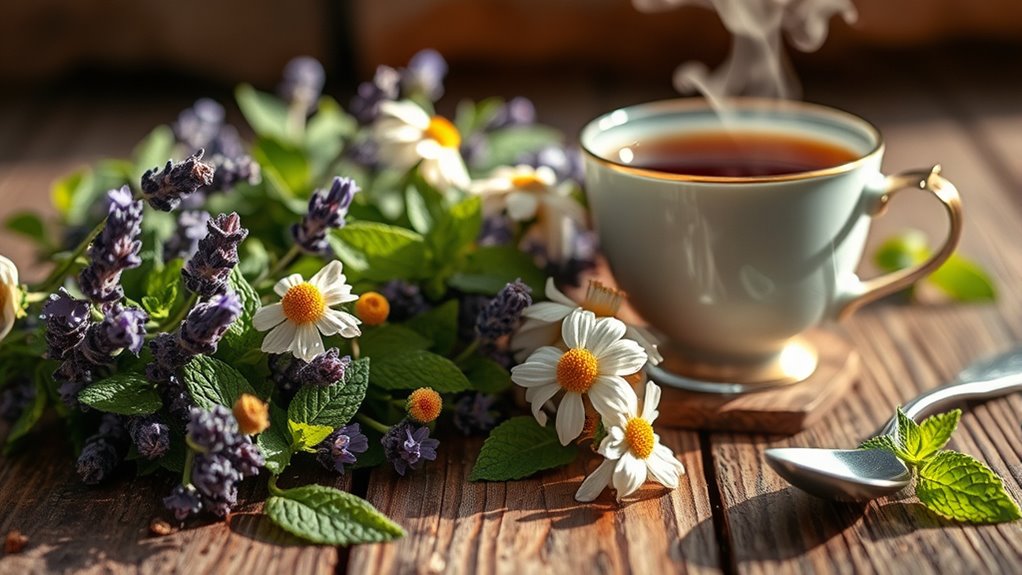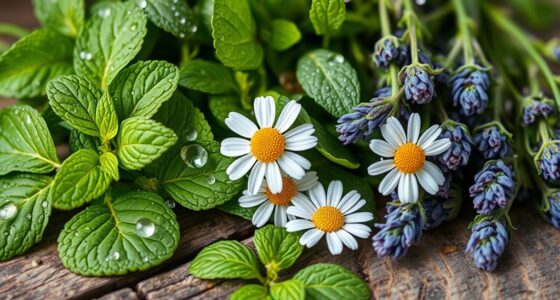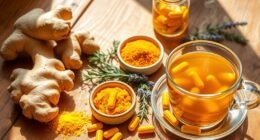To improve your sleep beyond chamomile tea, try herbs like valerian root, passionflower, lemon balm, and lavender. Valerian and passionflower work with GABA receptors to reduce nervous activity and help you fall asleep faster, while lemon balm calms anxiety. Lavender, whether as oil or tea, promotes relaxation and creates a sleep-friendly environment. Using these herbs alongside good sleep practices can make a noticeable difference, and exploring more can help you discover the best options for you.
Key Takeaways
- Valerian root and passionflower enhance sleep onset and duration by interacting with GABA receptors to calm neural activity.
- Lemon balm and lavender reduce anxiety and stress, creating a relaxing environment conducive to restful sleep.
- Incorporating calming herbs into a peaceful bedroom environment supports circadian rhythm and sleep quality.
- Use herbal supplements with proper dosing, from reputable sources, and consult healthcare providers if on medications or pregnant.
- Combining herbal remedies with good sleep hygiene practices maximizes natural sleep cycle regulation and overall restfulness.

If you struggle to fall asleep or stay asleep through the night, incorporating certain herbs into your bedtime routine might help. These herbs can support sleep cycle regulation, helping your body shift smoothly into restful sleep and wakefulness. When exploring herbal options, it’s crucial to consider herbal supplement safety, ensuring you choose high-quality products and follow recommended dosages to avoid adverse effects.
Herbs like valerian root and passionflower are well-known for their calming properties. Valerian, in particular, has been used for centuries to promote sleep by interacting with gamma-aminobutyric acid (GABA) receptors in your brain, which help reduce neural activity and induce relaxation. This can lead to easier sleep onset and improved sleep quality. Passionflower works similarly by increasing GABA levels, soothing your nervous system without causing dependency or grogginess the next day. When used correctly, these herbs can support your natural sleep cycle, helping you fall asleep faster and stay asleep longer.
Valerian root and passionflower promote relaxation by enhancing GABA activity, supporting natural sleep without dependency.
Another effective herb is lemon balm, which has gentle sedative effects and can ease anxiety that often interferes with sleep. Consuming lemon balm as a tea or supplement can calm your mind, making it easier to unwind at night. Similarly, lavender, whether as an essential oil or tea, has proven to promote relaxation and improve sleep quality. Its aroma can reduce stress hormones and create a sleep-friendly environment, supporting your body’s natural circadian rhythm.
Additionally, incorporating aesthetic wall organization solutions can help create a peaceful and clutter-free bedroom environment, which may enhance your sleep quality by reducing visual distractions and promoting relaxation. While these herbs are generally safe when used appropriately, herbal supplement safety remains a key consideration. Always opt for reputable brands that provide transparent ingredient sourcing and dosage guidelines. It’s wise to start with a lower dose to gauge your body’s response and avoid potential side effects like dizziness, gastrointestinal discomfort, or interactions with medications. If you’re pregnant, nursing, or on medication, consult your healthcare provider before adding herbal supplements to your routine. Some herbs, despite their natural origin, can interfere with medications or exacerbate certain health conditions.
Incorporating herbs into your evening routine doesn’t mean you need to replace sleep hygiene practices but rather complement them. Using herbal teas or supplements thoughtfully can help promote sleep cycle regulation naturally, without relying on pharmaceuticals. Just remember, the goal is to support your body’s natural rhythms safely and effectively, so prioritizing herbal supplement safety and mindful use is essential. By doing so, you’ll give yourself a better chance of enjoying restorative sleep night after night.
Frequently Asked Questions
Can Herbs Replace Prescription Sleep Medications Safely?
You wonder if herbs can replace prescription sleep meds safely. Natural herbs often offer a gentler alternative to synthetic drugs, but dosage considerations are vital to avoid side effects or interactions. While herbs may help improve sleep quality, you should consult your healthcare provider before making changes. They can guide you on safe dosages and ensure herbs are appropriate for your needs, making your sleep journey safer and more effective.
Are Herbal Sleep Aids Suitable for Children and Pregnant Women?
You should be cautious with herbal sleep aids if you’re considering them for children or pregnant women. Child safety varies, and some herbs may not be safe for young kids. Pregnancy considerations are essential because certain herbs could affect the fetus or trigger contractions. Always consult a healthcare professional before using herbal remedies in these situations to guarantee safety and avoid any adverse effects.
How Long Does It Take for Herbal Remedies to Improve Sleep?
Think of herbal remedies like a gentle tide—they gradually bring calm. The sleep improvement timeline varies depending on the herb and individual, but typically, you might notice effects within a few days to a couple of weeks. Herbal efficacy isn’t instant magic; it’s a slow dance of consistency and patience. Stick with your routine, and soon, restful nights may become your new normal as your body adjusts.
Can Herbs Cause Allergic Reactions or Interactions With Other Medicines?
Herbs can cause allergic reactions or medication interactions, so you should be cautious. You might experience allergic reactions like itching, swelling, or trouble breathing. Some herbs can also interfere with your medications, reducing their effectiveness or increasing side effects. Always check with your healthcare provider before adding herbs to your routine, especially if you’re on other medicines, to avoid potential adverse reactions and guarantee safe use.
What Is the Best Way to Prepare Herbal Infusions for Sleep?
Imagine you’re preparing herbal infusions for sleep, like a soothing lavender tea. To get the best results, use fresh or dried sleep herbs, steep them in hot water for about 10-15 minutes, and cover the cup to retain essential oils. Proper herbal infusion techniques guarantee you extract maximum benefits. You can also experiment with blending herbs like valerian or passionflower for personalized calming effects.
Conclusion
Incorporating these herbs into your bedtime routine can genuinely promote better sleep, but remember, individual responses vary. While many find relief with options like valerian or lavender, it’s essential to listen to your body and consult a healthcare professional if sleep issues persist. Trust in the natural power of these herbs, but also prioritize good sleep habits. With patience and consistency, you might just find your perfect night’s rest beyond just chamomile tea.










